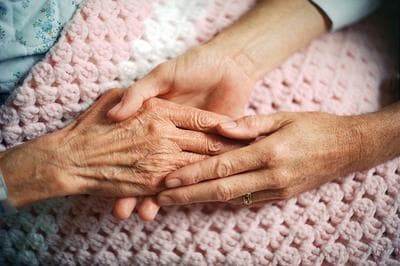Advertisement
'Compassionate Care' In U.K. After Deplorable Care, Alzheimer's Drowning
Sometimes it takes a disaster to make things better.
For Ken Schwartz, it was a diagnosis of late-stage lung cancer at age 40 that prompted this realization: at the core of first-class health care is the compassionate, human bond between patient and provider.
Schwartz' terrible medical ordeal — he died in 1995, ten months after his diagnosis — gave rise to the Schwartz Center for Compassionate Healthcare, and the nonprofit's signature program, the "Schwartz Center Rounds," which helps medical professionals better manage the tough social and emotional issues they face as caregivers. (We wrote about one particularly fraught case involving a speedy organ donation here.)
These days, Schwartz Rounds are held in about 300 hospitals and health care institutions in the U.S. and there's currently a waiting list of sites hoping to launch the program.
Now, in Britain, the National Health Service is adopting Schwartz Rounds in dozens, and eventually hundreds, of hospitals. Why? According to a news release from the Schwartz Center, U.K. Health Minister Dr. Dan Poulter says the program is criticallly needed: “Shocking failures of care [in our National Health Service] demonstrate the need for more compassionate care right across hospitals and care homes. Schwartz Center Rounds have been shown to help hospital and care staff support each other and learn about how to deal better with tough situations, and spend more time focused on caring for patients in a compassionate way.”
According to media reports, a number of horrific health-related disasters occurred at NHS hospitals over the last couple of years. One particularly alarming case involved the drowning of an Alzheimer's patient who was supposed to be closely monitored by care providers.
These incidents prompted the NHS to pursue widespread reform.

Here's more from the Schwartz Center news release:
Jocelyn Cornwell, director of the Point of Care Foundation, the U.K. organization responsible for spreading the program, said, “Doctors, nurses, health professionals and support workers all work extremely hard to deliver the best possible care to patients. But patients do not always have a good experience of healthcare – sometimes they don’t understand what is happening, their preferences aren’t taken into account or they aren’t spoken to sensitively. Often, this is because staff feel challenged or stressed by the high pressure environment in which they work.”
In the US, Schwartz Center Rounds are held at academic medical centers, community hospitals, cancer centers, outpatient practices, nursing homes, hospice and home care agencies and health plans. They provide a regularly scheduled time for doctors, nurses and other caregivers to connect, grieve, vent, explore and talk about all the things they don’t have time to process during their busy workdays.
In 2009, Point of Care, under contract with the Schwartz Center, piloted Schwartz Center Rounds at two of its hospitals. Today, 19 NHS sites support Rounds and healthcare leaders hope to eventually offer the program to all of the country’s 166 acute care trusts, the administrative arms of acute care hospitals. Trusts may administer more than one hospital. Rounds will also be adopted in community settings, such as physician practices and visiting nurse organizations.
The British government’s decision to promote Schwartz Center Rounds system-wide comes in the wake of revelations that many patients had received deplorable care in some National Health Service hospitals. NHS leadership is now instituting sweeping reforms that focus on creating a more standards-driven, humane healthcare system.
Over the past five years, Schwartz Center Rounds have grown exponentially across the United States, filling a profound need for connection among doctors, nurses and other caregivers, an increasing number of whom suffer from burnout. The program has been shown to enhance compassionate care to patients and families, improve communication and teamwork among healthcare staff and reduce caregiver stress and isolation.
This program aired on May 30, 2013. The audio for this program is not available.

